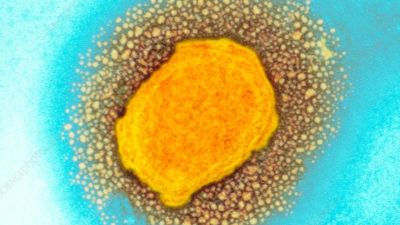Monkeypox: Medics must now alert health authorities to suspected cases

All medics in England must now alert local health authorities to suspected cases of monkeypox after the disease was designated as "notifiable".
The UK Health Security Agency (UKHSA) said laboratories must also tell it if the virus is identified in a sample.
To date, 302 infections have been confirmed in the UK.
Wendi Shepherd, monkeypox incident director at UKHSA, said: “Rapid diagnosis and reporting is the key to interrupting transmission and containing any further spread of monkeypox.
“This new legislation will support us and our health partners to swiftly identify, treat and control the disease.
“It also supports us with the swift collection and analysis of data which enables us to detect possible outbreaks of the disease and trace close contacts rapidly, whilst offering vaccinations where appropriate to limit onward transmission.”
Want a quick and expert briefing on the biggest news stories? Listen to our latest podcasts to find out What You Need To Know
David Heymann, professor of infectious disease epidemiology at the London School of Hygiene & Tropical Medicine (LSHTM), said: “Making monkeypox a notifiable disease suggests a desire to be sure to have reporting from all sectors (public and private) and all parts of the NHS.
“It suggests that the government wants to focus surveillance on the entire population – not only on the risk groups identified so far.
“This will permit clear identification of all risk groups and help better understand the epidemiology and extent of spread.”
The move isn't a sign that the disease is being seen as more dangerous but it's an indication that the government wants to keep an eye on it, as Health Editor Emily Morgan explains
What are the symptoms of monkeypox?
It usually takes between five and 21 days for the first symptoms of the infection to appear.
The first symptoms of monkeypox include:
a high temperature
a headache
muscle aches
backache
swollen glands
shivering (chills)
exhaustion
A rash, which often begins on the face before spreading, usually appears one to five days after the first symptoms.
Anyone can get monkeypox, particularly if you have had close contact, including sexual contact, with an individual with symptoms. People who are gay or bisexual, and men who have sex with men remain disproportionately affected, according to the UKHSA.
Monkeypox is not normally a sexually-transmitted infection, but it can be passed on by direct contact during sex.
It can also be spread through touching clothing, bedding or towels used by someone with the monkeypox rash.
According to the UKHSA, monkeypox does not usually spread easily between people and the overall risk to the UK population remains low.
Anyone with unusual rashes or lesions on any part of their body, especially their genitalia, should contact NHS 111 or call a sexual health service if they have concerns, it said.
The disease is usually mild but can cause severe illness in some cases.